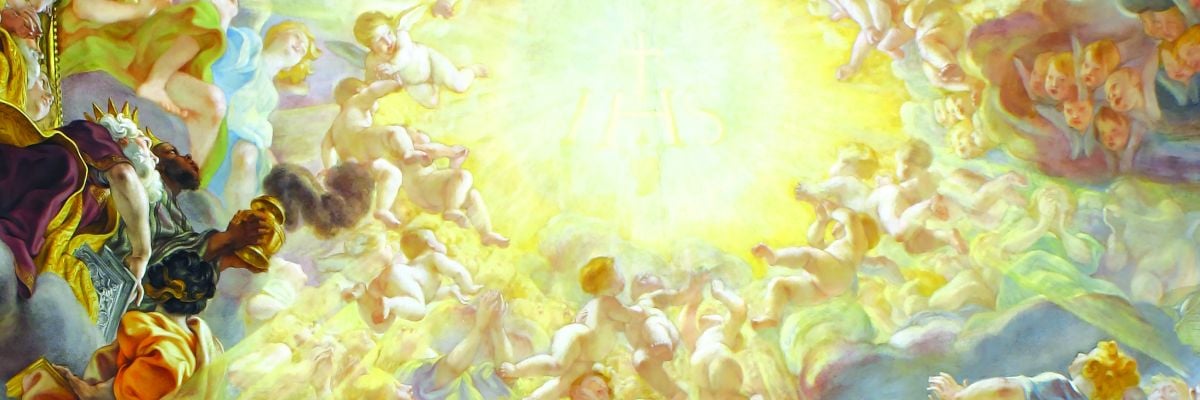
Scripture says, “In all you do, remember the end of your life, and then you will never sin” (Sir. 7:36). Commenting on this passage, St. Thomas More says that it’s not enough to know about the “four last things” (death, judgment, heaven, and hell), we must actively remember them by keeping them always in view.
You might think that such a grand promise would mean Christians meditated constantly on heaven and hell (as the saints suggest doing regularly). But in fact, little is spoken of about either reality.
In part, this is because heaven is, quite literally, unimaginably glorious. St. Paul promises that “what God has prepared for those who love him” is beyond what any eye has ever seen, or ear ever heard, or “heart of man conceived” (1 Cor. 2:9).
The limitations of our ability to imagine heaven are painfully obvious. Early in his career, Billy Graham suggested that in heaven “the angels will wait on us, and we’ll drive down the golden streets in a yellow Cadillac convertible.” Contrast this with the testimony of St. John that “we are God’s children now; it does not yet appear what we shall be, but we know that when he appears, we shall be like him, for we shall see him as he is” (1 John 3:2). One view is all too human, all too worldly; the other is divine.
This divine transformation begins even now as we behold “the glory of the Lord” and are “being changed into his likeness from one degree of glory to another” (2 Cor. 3:18). St. Thomas Aquinas says that it “is the nature of love to transform the lover into the object loved. And so, if we love God, we ourselves become divinized.” Thus, “he who is united to the Lord becomes one spirit with him” (1 Cor. 6:17).
This is the way Scripture speaks of heaven: the pure and perfect love of God, transforming us to become like him. This transformation is referred to as divinization, glorification, or theosis.
This also explains the role of the Virgin Mary and the saints in heaven. Love is not jealous (1 Cor. 13:4). God is not jealous of his creatures, any more than a great artist is jealous of the beauty of his paintings. On the contrary, that beauty glorifies the artist, which is why St. Paul can speak of Christ’s Second Coming as the day on which Jesus is “glorified in his saints” (2 Thes. 1:10). It’s also why St. John speaks of God’s throne in heaven as being surrounded by “twenty-four thrones, and seated on the thrones were twenty-four elders, clad in white garments, with golden crowns upon their heads” (Rev. 4:4).
Jesus likewise refers to the enthronement of the saints (particularly the Twelve) in Matthew 19:28 and Luke 22:30; and in Rev. 1:26, he promises that “he who conquers and who keeps my works until the end, I will give him power over the nations.”
The Mother of God in particular is depicted as “clothed with the sun, with the moon under her feet, and on her head a crown of twelve stars” (Rev. 12:1). The divine plan isn’t for us to passively sit back and watch God’s glory but to join in that glory, becoming “one spirit with him.”
Then what about hell? How can an all-good, all-powerful God send anyone to hell? The answer lies in what has just been said. We all have a “God-shaped hole” that only he can fill. With the Psalmist, we can each say, “Thy face, Lord, do I seek. Hide not thy face from me” (Ps. 27:8-9), or with Moses, “I pray thee, show me thy glory” (Exod. 33:18).
God is perfect and infinite good, which means that he, and he alone, can satisfy the infinite longings of the human heart. The corollary of this is unavoidable: that if we reject him, we reject all that is good.
Just as the divine transformation can be observed (to an extent) here and now, the same can be said for the opposite. When anyone seeks to fill that God-shaped hole with something other than God, they quickly discover that the hole is infinite. No amount of money, or power, or fame, or sex, or food or drink will ever be enough.
Pope Francis describes the human condition well by saying, “Our infinite sadness can only be cured by an infinite love.” Reject this infinite love, and you’re eventually (and eternally) left with infinite, incurable sadness.
One of the gifts that God gives us is the gift of free will, and if we freely and consciously reject God, or choose some created good over God, we’ll quickly and painfully discover what the saints discover with great joy: that “for God alone my soul waits in silence; from him comes my salvation” (Ps. 62:1).



